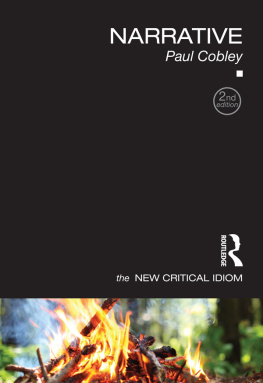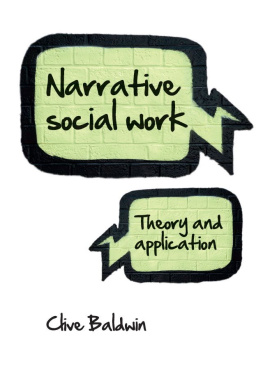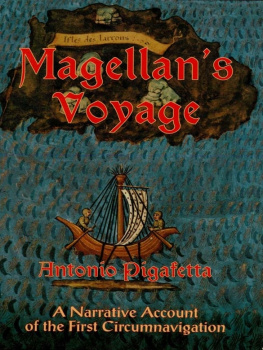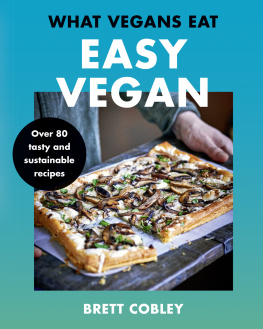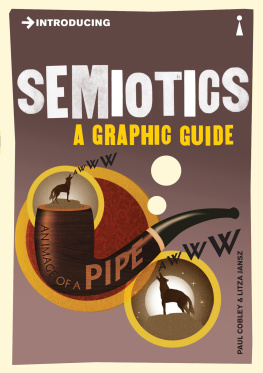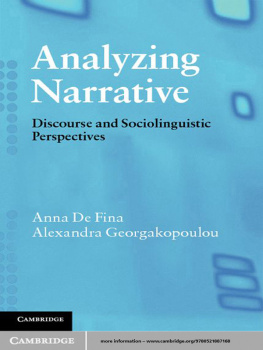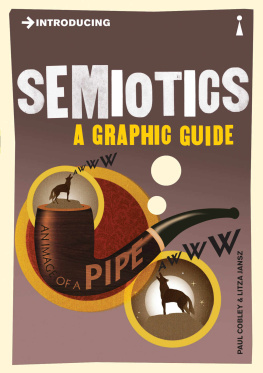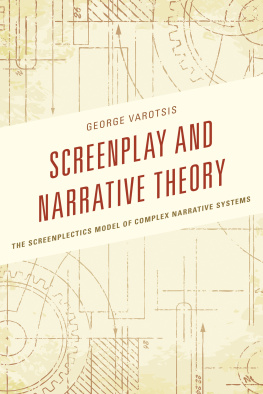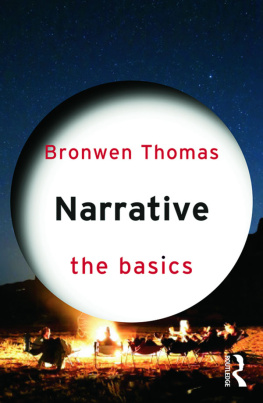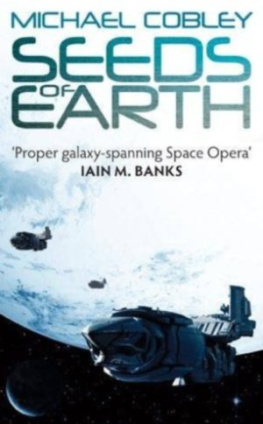Cobley - Narrative
Here you can read online Cobley - Narrative full text of the book (entire story) in english for free. Download pdf and epub, get meaning, cover and reviews about this ebook. publisher: Routledge, genre: Romance novel. Description of the work, (preface) as well as reviews are available. Best literature library LitArk.com created for fans of good reading and offers a wide selection of genres:
Romance novel
Science fiction
Adventure
Detective
Science
History
Home and family
Prose
Art
Politics
Computer
Non-fiction
Religion
Business
Children
Humor
Choose a favorite category and find really read worthwhile books. Enjoy immersion in the world of imagination, feel the emotions of the characters or learn something new for yourself, make an fascinating discovery.
- Book:Narrative
- Author:
- Publisher:Routledge
- Genre:
- Rating:3 / 5
- Favourites:Add to favourites
- Your mark:
- 60
- 1
- 2
- 3
- 4
- 5
Narrative: summary, description and annotation
We offer to read an annotation, description, summary or preface (depends on what the author of the book "Narrative" wrote himself). If you haven't found the necessary information about the book — write in the comments, we will try to find it.
Narrative — read online for free the complete book (whole text) full work
Below is the text of the book, divided by pages. System saving the place of the last page read, allows you to conveniently read the book "Narrative" online for free, without having to search again every time where you left off. Put a bookmark, and you can go to the page where you finished reading at any time.
Font size:
Interval:
Bookmark:
Human beings have constantly told stories, presented events and placed the world into narrative form. This activity suggests a very basic way of looking at the world, yet, this book argues, even the most seemingly simple of stories is embedded in a complex network of relations. Paul Cobley traces these relations, considering the ways in which humans have employed narrative over the centuries to re-present time, space and identity.
This second, revised and fully updated edition of the successful guidebook to narrative covers a range of narrative forms and their historical development from early oral and literate forms through to contemporary digital media, encompassing Hellenic and Hebraic foundations, the rise of the novel, realist representations, narratives of imperialism, modernism, cinema, postmodernism and new technologies. A final chapter reviews the way that narrative theory has re-orientated definitions of narrative in the last decade.
Written in a clear, engaging style and featuring an extensive glossary of terms, this is the essential introduction to the history and theory of narrative.
Paul Cobley is Professor in Language and Media at Middlesex University, UK. He is the author of a number of books including The American Thriller (2000) as well as editor of a number of volumes including The Routledge Companion to Semiotics (2010).
SERIES EDITOR: JOHN DRAKAKIS, UNIVERSITY OF STIRLING
The New Critical Idiom is an invaluable series of introductory guides to todays critical terminology Each book:
provides a handy, explanatory guide to the use (and abuse) of the term;
offers an original and distinctive overview by a leading literary and cultural critic;
relates the term to the larger field of cultural representation.
With a strong emphasis on clarity, lively debate and the widest possible breadth of examples, The New Critical Idiom is an indispensable approach to key topics in literary studies.
Also available in this series:
Adaptation and Appropriation by Julie Sanders
Allegory by Jeremy Tambling
The Author by Andrew Bennett
Autobiography second edition by Linda Anderson
Class by Gary Day
Colonialism/Postcolonialism second edition by Ania Loomba
Comedy by Andrew Stott
Crime Fiction by John Scaggs
Culture/Metaculture by Francis Mulhern
Dialogue by Peter Womack
Difference by Mark Currie
Discourse second edition by Sara Mills
Drama/Theatre/Performance by Simon Shepherd and Mick Wallis
Dramatic Monologue by Glennis Byron
Ecocriticism second edition by Greg Garrard
Elegy by David Kennedy
Epic by Paul innes
Fairy Tale by Andrew Teverson
Genders second edition by David Glover and Cora Kaplan
Genre by John Frow
Gothic second edition by Fred Botting
Grotesque by Justin D Edwards and Rune Graulund
The Historical Novel by Jerome de Groot
Historicism second edition by Paul Hamilton
Humanism second edition by Tony Davies
Ideology second edition by David Hawkes
Interdisciplinarity second edition by Joe Moran
Intertextuality second edition by Graham Allen
Irony by Claire Colebrook
Literature by Peter Widdowson
Lyric by Scott Brewster
Magic(al) Realism by Maggie Ann Bowers
Memory by Anne Whitehead
Metaphor by David Punter
Metre, Rhythm and Verse Form by Philip Hobsbaum
Mimesis by Matthew Potolsky
Modernism second edition by Peter Childs
Myth second edition by Laurence Coupe
Narrative second edition by Paul Cobley
Parody by Simon Dentith
Pastoral by Terry Gifford
Performativity by James Loxley
The Postmodern by Simon Malpas
Realism by Pam Morris
Rhetoric by Jennifer Richards
Romance by Barbara Fuchs
Romanticism second edition by Aidan Day
Science Fiction second edition by Adam Roberts
Sexuality second edition by Joseph Bristow
Spatiality by Robert T. Tally Jr
Stylistics by Richard Bradford
Subjectivity by Donald E. Hall
The Sublime by Philip Shaw
Temporalities by Russell West-Pavlov
Translation by Susan Bassnett
Travel Writing by Carl Thompson
The Unconscious by Antony Easthope
First published 2001, this edition published 2014
by Routledge
2 Park Square, Milton Park, Abingdon, Oxon OX14 4RN
and by Routledge
711 Third Avenue, New York, NY 10017
Routledge is an imprint of the Taylor & Francis Group, an informa business
2001, 2014 Paul Cobley
The right of Paul Cobley to be identified as author of this work has been asserted by him in accordance with sections 77 and 78 of the Copyright, Designs and Patents Act 1988.
All rights reserved. No part of this book may be reprinted or reproduced or utilised in any form or by any electronic, mechanical, or other means, now known or hereafter invented, including photocopying and recording, or in any information storage or retrieval system, without permission in writing from the publishers.
Trademark notice: Product or corporate names may be trademarks or registered trademarks, and are used only for identification and explanation without intent to infringe.
British Library Cataloguing in Publication Data
A catalogue record for this book is available from the British Library
Library of Congress Cataloging in Publication Data
Cobley, Paul, 1963
Narrative / Paul Cobley. 2nd edition.
pages cm. (The New Critical Idiom)
Includes bibliographical references and index.
1. Narration (Rhetoric) 2. Fiction History and criticism. I. Title.
PN3383.N35C63 2013
808.036 dc23
2013019875
ISBN: 978-0-415-83443-8 (hbk)
ISBN: 978-0-415-83444-5 (pbk)
ISBN: 978-0-203-49492-9 (ebk)
Typeset in Garamond
by Taylor & Francis Books
The New Critical Idiom is a series of introductory books which seeks to extend the lexicon of literary terms, in order to address the radical changes which have taken place in the study of literature during the last decades of the twentieth century. The aim is to provide clear, wellillustrated accounts of the full range of terminology currently in use, and to evolve histories of its changing usage.
The current state of the discipline of literary studies is one where there is considerable debate concerning basic questions of terminology. This involves, among other things, the boundaries which distinguish the literary from the non-literary; the position of literature within the larger sphere of culture; the relationship between literatures of different cultures; and questions concerning the relation of literary to other cultural forms within the context of interdisciplinary studies.
It is clear that the field of literary criticism and theory is a dynamic and heterogeneous one. The present need is for individual volumes on terms which combine clarity of exposition with an adventurousness of perspective and a breadth of application. Each volume will contain as part of its apparatus some indication of the direction in which the definition of particular terms is likely to move, as well as expanding the disciplinary boundaries within which some of these terms have been traditionally contained. This will involve some re-situation of terms within the larger field of cultural representation, and will introduce examples from the area of film and the modern media in addition to examples from a variety of literary texts.
Font size:
Interval:
Bookmark:
Similar books «Narrative»
Look at similar books to Narrative. We have selected literature similar in name and meaning in the hope of providing readers with more options to find new, interesting, not yet read works.
Discussion, reviews of the book Narrative and just readers' own opinions. Leave your comments, write what you think about the work, its meaning or the main characters. Specify what exactly you liked and what you didn't like, and why you think so.

